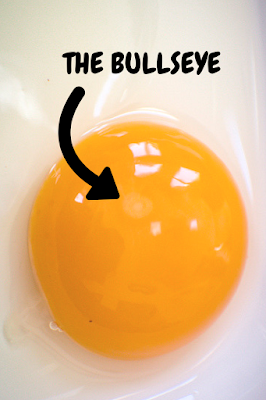Your Guide to Grocery-Store Egg-Labels: Cage Free Eggs: Part 2 + Fertile Eggs vs. "Regular Eggs"
Welcome back for part two of "your guide to grocery-store egg-labels!" This week will be a short layout of what "cage-free" means.
I couldn't help but choose the picture above for the cover photo of this week's newsletter! In the egg carton above, Trader Joe's took cage-free to a different level according to their picture. Their picture is rather misleading because it looks like it should have been pasted on a free-range, or even a pasture-raised egg carton.
In essence, cage-free eggs are eggs that are produced from chickens that are not kept in cages. Essentially, take all the cages out, then leave the chickens in the barn. The layout of the barn can vary when it comes to the placement of drinkers, feeders, and nest-boxes, with some barns using an aviary system. The aviary system turns sections of the barn into "shelf-like" structures where roosting bars (places where chickens sleep and perch), nest boxes, ect... are placed.
Don't get me wrong, these cage-free structures are kind of cool, or are at least interesting to look at. It's kind of like a big apartment complex for chickens. Generally, cage-free farms have a higher mortality rate than caged egg farms, mostly because there is (a) more places for chickens to fall from, and (b) chickens are in closer contact with their own droppings (can lead to disease). In a caged system, the chickens' droppings fall through the wire, and is carried away on a conveyor, which keeps their living space pretty clean, and limits flies. Another "con" to cage-free egg production is that there is a greater chance of several chickens laying eggs on the floor of the barn instead of the nest boxes (essentially, that means less eggs for farmer Brown, or whatever you might call him:) For those three reasons (there may be more), that is why cage-free eggs are a dollar or two more expensive than caged eggs.
While on the topic of eggs, I recently got a question about the difference between hatching eggs and store bought eggs. Well, I thought, "this question will fit perfectly with the series about different kinds of eggs!"
Chances are, when you buy an egg from the store, it will not be able to hatch a chick if incubated. The reason being is because commercial farms don't keep roosters. No rooster = no fertile eggs. There is a small (extremely small) chance that there could have been a rooster slip through at the hatchery while being sexed (because people can make errors), but most commercial breeds used for eggs are able to be sexed by feather color right after hatching. And that's another topic for another post!
Are fertile eggs edible?
Yes! There is no taste or color difference between an unfertile/fertile egg. I don't recommend letting fertile eggs sit in a warm environment for days on end, because they can attempt to incubate, but otherwise, you probably would not be able to tell the difference unless you really knew what to look for.
And that is what a fertile egg looks like. Without that "bullseye," you probably wouldn't be able to tell! It's that minute of a difference.





Comments
Post a Comment